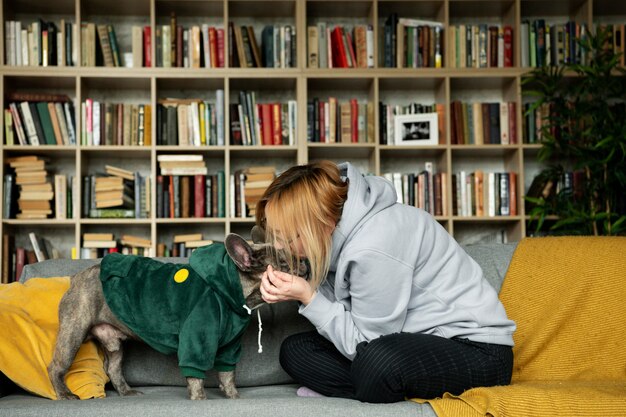Back-to-School Tips to Reduce Pet Anxiety at Home


Back-to-School Tips to Reduce Pet Anxiety at Home
As summer winds down and families in Urbana begin preparing for the busy back-to-school season, many pet owners notice changes in their dog or cat's behavior. With children and adults suddenly out of the house for longer hours, it is not uncommon for pets to develop signs of stress or separation anxiety. At Urbana Veterinary Clinic, located at 985 Norwood Ave, Urbana, OH 43078, we understand how difficult these transitions can be for both pets and their families. Our experienced team of veterinarians is here to help you recognize, manage, and reduce back to school pet anxiety, ensuring your furry companions remain happy and healthy as routines shift.
In this blog, we will cover how to spot warning signs of pet separation stress Urbana families may encounter, explore the common causes of anxiety related to seasonal changes, and provide practical tips for both prevention and treatment. We will also discuss when it is time to schedule an appointment with our clinic and how our comprehensive veterinary services in Urbana can support your pet's emotional and physical wellbeing. For more information about maintaining your pet’s overall health, consider scheduling a wellness examination with our team.
Recognizing Back to School Pet Anxiety: Signs and Symptoms
When the school year begins, pets in Urbana and surrounding communities may suddenly find themselves home alone for longer periods. This abrupt change can be confusing or distressing, especially for dogs and cats who are used to the constant presence of their families. Pet owners often wonder how to distinguish between normal adjustment behaviors and true pet separation stress Urbana pets may experience.
Key symptoms include excessive vocalization such as barking or meowing, destructive behaviors like chewing furniture or scratching doors, and inappropriate elimination with pets urinating or defecating indoors despite being house-trained. Additionally, some pets may become withdrawn, hide more often, or even lose interest in food and play. Cats and dogs may also exhibit pacing, drooling, or trembling when family members begin their morning routines to leave the house. Physical signs like excessive grooming or licking can also indicate anxiety.
It is important to observe your pet’s behavior closely during the first weeks of the school year. Noting these changes early allows you to intervene before anxiety escalates or becomes an ingrained habit. If you observe persistent or severe symptoms, reaching out to a "vet near me" for guidance can be crucial for your pet's wellbeing.
Understanding Why Pets Develop Separation Stress During the School Year
Back to school pet anxiety is a frequent concern for families in Urbana because pets thrive on routine and companionship. When the household suddenly empties during the daytime, dogs and cats can feel confused or abandoned. The abrupt shift in activity levels, sounds, and social interaction can trigger stress responses, especially in pets who are highly bonded to their humans.
Several factors contribute to separation anxiety this time of year. Sudden changes in daily schedules, such as longer periods of solitude or shorter walks and play sessions, are common triggers. Pets who have spent the summer with children at home or enjoyed frequent outdoor activities may struggle the most. Additionally, young animals, newly adopted pets, or those with a history of anxiety may be particularly susceptible to stress when routines change.
Environmental cues, like the sound of backpacks zipping or keys jingling, can signal to your pet that they are about to be left alone. Over time, pets can develop strong associations with these cues, intensifying their anxious responses each morning. Recognizing the sources of stress can help you take proactive steps to minimize their impact and support your pet’s adjustment.
Managing Back to School Pet Anxiety in Urbana: Professional Guidance
If your dog or cat is struggling with pet separation stress Urbana families often witness during the fall, the veterinary professionals at Urbana Veterinary Clinic offer several ways to help. The first step is a thorough evaluation by our team, which may include a comprehensive pet exam to rule out underlying medical conditions that could contribute to behavioral changes. Sometimes, physical discomfort or illness can mimic or exacerbate anxiety symptoms, so a medical assessment is an important starting point.
Treatment approaches involve a combination of behavioral strategies, environmental enrichment, and in some cases, medical intervention. Our veterinarians may recommend desensitization techniques, which gradually help your pet become more comfortable with being alone. This process might include short departures at first, paired with positive reinforcement when your pet remains calm. Our team may also suggest interactive toys, puzzle feeders, or safe chews to keep your pet mentally stimulated during the day.
For pets experiencing significant distress, additional support may be necessary. In certain cases, pheromone diffusers, calming supplements, or prescription medications can provide relief, always under the guidance of our veterinary professionals. We work closely with you to develop a personalized plan, considering your pet’s temperament, age, and home environment.
Regular check-ins and wellness exams are essential to track progress and adjust strategies as needed. If you are concerned about your pet’s emotional health, scheduling an appointment with our clinic allows us to provide tailored advice and support specific to your situation in Urbana.
Practical Steps for Reducing Pet Anxiety at Home
Supporting your pet through the back-to-school transition involves both preparation and patience. The following steps can help ease anxiety and create a more comfortable environment for your dog or cat:
Start by gradually adjusting your daily routine before the school year begins. Practicing short absences, even if you are still at home, allows your pet to acclimate to being alone for brief periods. Another important strategy is to create a safe, cozy space in your home where your pet can relax, such as a favorite bed or quiet room with familiar toys and blankets.
Consistent exercise and mental stimulation are crucial for pets in Urbana and surrounding communities. Morning walks or play sessions can help burn off excess energy and reduce stress before everyone leaves for the day. Leaving the radio or TV on at a low volume can also provide comforting background noise, helping your pet feel less isolated.
You may consider rotating interactive toys or food puzzles throughout the week to keep your pet engaged. Some families find that using items with their scent, such as a worn T-shirt, can offer reassurance to pets while they are away. Remember to keep arrivals and departures calm and low-key to avoid reinforcing anxious behaviors.
Enrolling your pet in a preventive care program, including regular wellness examinations and vaccination services, supports both physical and emotional health. These visits allow our veterinarians to monitor for any emerging concerns and provide guidance tailored to your pet’s needs.
When to Schedule an Appointment with Urbana Veterinary Clinic
While many pets adjust to the back-to-school routine with time and gentle support, some require professional intervention. You should schedule an appointment if your pet displays persistent signs of distress, such as ongoing destructive behavior, frequent accidents in the house, loss of appetite, or self-injury like excessive licking or chewing. Escalating symptoms or sudden changes in personality can indicate that your dog or cat is not coping well with the transition.
Additionally, if you notice any physical health concerns, such as vomiting, diarrhea, or unexplained weight loss, it is important to consult with our veterinary team promptly. These symptoms can sometimes be linked to stress but may also signal underlying medical conditions that need attention.
Our veterinary professionals are experienced in diagnosing and managing behavioral and medical issues related to pet separation stress Urbana families face. We encourage you to reach out if you have concerns or if your home care strategies are not providing adequate relief. Early intervention can prevent anxiety from becoming a long-term problem and improve your pet’s quality of life.
Supporting Pets in Urbana and Surrounding Communities Through Life’s Changes
Back to school pet anxiety is a common challenge for families in Urbana, but with the right approach, your pet can adapt and thrive. By recognizing the signs of stress, understanding the factors that contribute to anxiety, and taking proactive steps at home, you can make this transition smoother for everyone. Our team of veterinarians at Urbana Veterinary Clinic is dedicated to helping your pets feel safe and supported, no matter what life changes come your way.
If you have questions about back to school pet anxiety, need advice on creating a calming environment, or would like to schedule a wellness examination, we invite you to contact us today. Our comprehensive veterinary services in Urbana are designed to support both the physical and emotional health of your pets. You can reach our clinic at (937) 653-7326 or visit us at 985 Norwood Ave, Urbana, OH 43078. We are proud to be the "vet near me" that families trust in Urbana and surrounding communities. For more information about preventive care or to book your next visit, explore our wellness examination and vaccination services pages.
Your pet’s comfort and happiness are our top priorities as the seasons change. Let us partner with you to ensure a smooth, healthy transition for your beloved companion this fall.
References:
- American Veterinary Medical Association - Separation Anxiety in Dogs
- ASPCA - Separation Anxiety
- Ohio State University College of Veterinary Medicine - Behavioral Health Resources
The information in this blog is intended for educational purposes only and should not replace professional veterinary advice. If you have specific concerns about your pet’s health or behavior, please consult with a veterinarian.




















